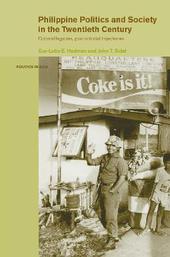
|
Philippine Politics and Society in the Twentieth Century: Colonial Legacies, Post-colonial Trajectories
Hardback
Main Details
| Title |
Philippine Politics and Society in the Twentieth Century: Colonial Legacies, Post-colonial Trajectories
|
| Authors and Contributors |
Edited by Eva-Lotta Hedman
|
|
Edited by John T. Sidel
|
| Series | Politics in Asia |
|---|
| Physical Properties |
| Format:Hardback | | Pages:224 | | Dimensions(mm): Height 234,Width 156 |
|
| Category/Genre | Asian and Middle Eastern history
World history - from c 1900 to now |
|---|
| ISBN/Barcode |
9780415147903
|
| Classifications | Dewey:320.9599 |
|---|
| Audience | | Undergraduate | | Postgraduate, Research & Scholarly | | Professional & Vocational | |
|---|
| Illustrations |
black & white illustrations
|
|
Publishing Details |
| Publisher |
Taylor & Francis Ltd
|
| Imprint |
Routledge
|
| Publication Date |
9 November 2000 |
| Publication Country |
United Kingdom
|
Description
Well over a decade has passed since the dramatic 'People Power Revolution' in Manila, yet until now no book length study has emerged to examine the manifold changes underway in the Philippines in the post-Marcos era. This book fills that gap. Philippine Politics and Society in the Twentieth Century offers historical depth and sophisticated theoretical insight into contemporary life in the archipelago. Organised as a set of interrelated thematic essays rather than a chronological account, the book addresses key topics which will be of interest to the academic and non academic reader, such as trends in national-level and local politics, the role of ethnic-Chinese captial in the Philippine economy, nationalism and popular culture, and various forms of political violence and extra-electoral contestation. Drawing on a wide variety of primary and secondary sources, as well as over a decade of research and work in the area, Hedman and Sidal provide a invaluable overview of the contemporary and historical scene of a much misunderstood part of Southeast Asia. This book fills an important gap in the literature for readers interested in understanding the Philippines as well as students of Asian studies, comparative politics, political economy and cultural studies.
|